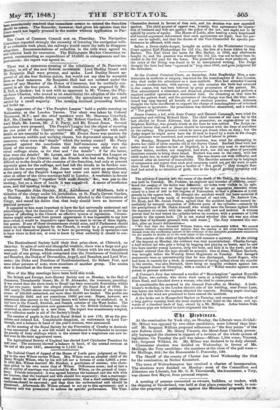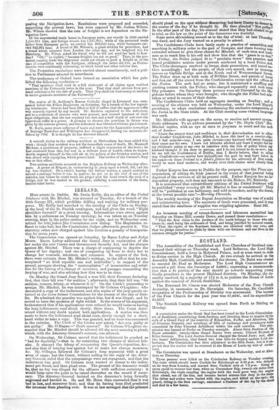gbe Wrobintts.
At the nomination for York city, on Monday, the Liberals were divided: Mr. Milner was opposed by two other candidates, more Liberal than him- self. Mr. Sergeant Wilkins proposed adherence to "the four points" of the new Reform creed. Mr. Henry Vincent, the Moral-force Chartist, person- ally harangued the electors in support of a revision of the whole system of legislation. On Tuesday the poll was taken—Milner' 1,504 votes; Vincent, 861; Sergeant Wilkins, 56. Mr. Milner was declared to be duly elected. Cirencester election was decided on Wednesday, in favour of Mr. Mullings, the Tory candidate: the numbers at the close of the poll were— for Mullings, 262; for the Honourable C. Ponsonby, 130.
The Sheriff of the county of Chester has fixed Wednesday the 31st for the nomination, at Nether Knutsford.
The town of Wolverhampton has received a charter of incorporation. The elections were finished on Monday: most of the Councillors and Aldermen are Liberals, but Mr. G. B. Thornicroft, the ironmaster, a Tory, was chosen first Mayor, from personal respect.
A meeting of persons connected as owners, builders, or traders, with the shipping of Sunderland, was held at that place yesterday week, to con- sider the propriety of petitioning against the Ministerial proposals for re-
pealing the Navigation-laws. Resolutions were proposed and seconded, supporting the present laws; but were opposed by Mr. Joshua Wilson. Mt. Wilson showed that the rate of freights is not dependent on the Na- vigation-laws.
Of the unprotected trade hence to European ports, oar vessels in 1846 carried 1,555,884 tens, and foreign vessels but 1,337,365; while of the protected trade hither from European ports, we carried but 308,635 tons, while foreigners car- ried 943,901 tans. A friend of Mr. Wilson's, a great stickler for protection, bad a vessel which returned from London the other day, and he freighted her for Ramburg. Mr. Wilson asked his friend why he did not send her back to Lon- don? "Oh ! " he replied, " because freights are not so good." Thus, in the pro- tected coasting trade the shipowner could not obtain so good a freight as in the race of competition with the foreigner, although the latter did live, as Protec- tionists were continually reiterating, on black bread and other inferior diet.
The Protection resolutions were carried almost unanimously, and a peti- tion to Parliament adopted in accordance.
The tradesmen of Oxford have formed an association which has pub- lished the following resolution- " That members shall send in a full statement of all claims upon resident Members of the University twice in the year. That they shall abstain from per- sonal solicitation for the sale of goods. That they shall not lend money at interest to under-graduate members of the University.*
The sexton of St. Anthony's Roman Catholic chapel in Liverpool was awn- messed before the Police Magistrate on Saturday, for a breach of the law regard- ing interments. Graves had been filled so full of coffins that the uppermost coffin was scarcely coyered by any mould. Mr. Rushton explained to the defendant, and to a multitude of sextons who were present, and seemed ignorant of their legal obligations, that the law required two feet and a half depth of soil over the uppermost coffin in a grave. A promise to observe the provision in future was given by the sextons present, and the defendant was liberated without punishment.
W. Royle, some years collector of taxes and rates for the Lancashire townships of Burnage Rushohne and Wilkington has disappeared, leaving his accounts de- ficient by 7001. It is thought he has drowned himself.
A seventh victim to the railway accident at Shrivenham has been added this week; though that accident was not theirnmediate cause of death. Mr. Maunsell Mitham, a gentleman of property, suffered a slight concussion of the brain; he had recovered from this, but was in a delicate state of health, when he impru- dently exposed himself to the cold air on the gallery of the Swindon station, and was seized with erysipelas, which proved fatal. The verdict of the Coroner's Jury was to that effect.
Two serious accidents occurred on the Brighton Railway on Wednesday after- noon. A porter at Reigate, in endeavouring to jump upon a track, fell, and his leg was crushed. On a train's leaving the Sutton station, a guard omitted to ascend a carriage before it was in motion; he got on to the roof of one of the vehicles, but before he could reach his proper past his head struck the arch of a bridge, and he was dashed to the ground; suffering a concussion of the brain, besides other hurts.



























 Previous page
Previous page